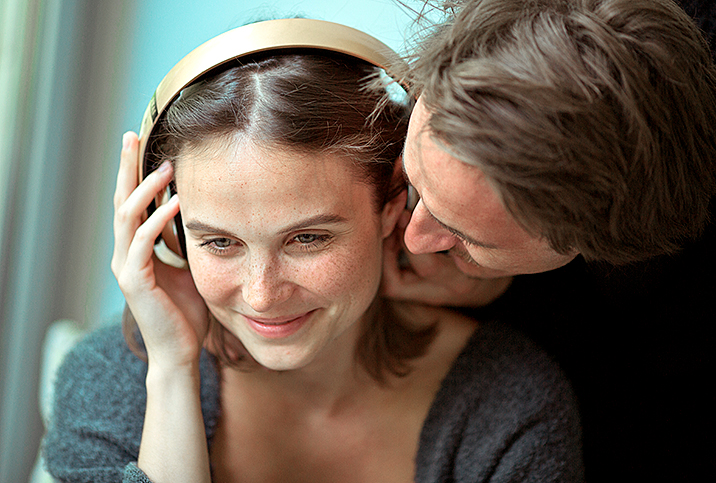Daddy, Chill: Navigating Relationships With Age Gaps

It's a millennial's worst nightmare: They text a boomer or Gen X'er, only to have them reply with a dreaded phone call. For younger generations, texting isn't just a way to shoot off their favorite emojis and gifs, it's a courteous, convenient and succinct way to communicate.
On the other hand, an unplanned phone call is viewed as demanding, presumptive, disruptive and inconsiderate, requiring someone's undivided attention and indefinite time with zero notice.
In contrast, boomers and Gen Xers think texts are...well, honestly, who knows what they think! (Relax, gramps, it was just a joke.)
What are the generational differences?
Of course, communication preference is just one example of how generational differences can cause tension and conflict in relationships (romantic or otherwise). In many ways, each generation has a distinct culture of its own and there can be "cross-cultural" divides to overcome when encountering someone from a generation other than yours.
Different tastes in music and entertainment often pop up, as can different beliefs, politics, humor, diet, lifestyle and fashion—skinny jeans and side parts are officially for the "elderly" now thanks to Gen Z's brutal, albeit honest, observations. And there are differences in language style, slang usage, trends and fads, too. (Have you ever had to explain a meme to mom and dad, or had one explained to you?)
Sexually and physically, there can be differences in libidos, sexual abilities and energy levels, which all typically change with age. For example, a low sex drive caused by hormonal changes in menopause or erectile dysfunction (ED) due to aging can bring entirely new challenges for a younger person in a relationship with someone older.
Thinking about attraction and sexual orientation, younger generations are far more likely to identify as sexually fluid than older generations who tend to lean toward a more binary way of thinking.
Judgment from society, and from friends and family, can also be a problem, especially if the age gap between partners is large and all parties are consenting adults.
However, all these variances do not mean younger-older relationships are doomed. Like other relationships, one with a sizable age gap simply requires patience, understanding, effort and work from everyone involved.
How to navigate a younger-older relationship
Sarah Rattray, Ph.D., a leading couples psychologist with more than 30 years' practice in Washington state, founded and serves as CEO of the Couples Communication Institute, which is dedicated to helping couples achieve lasting closeness and intimacy through effective communication.
"I have worked with several couples with large age gaps. One of the most common issues unique to couples with age gaps is their different stages of life, and the way their stage of life naturally impacts their lifestyles," Rattray said. "For example, one partner still finishing their education and the other partner long since out of school, one partner wanting children and the other partner either already done or feeling too old to get started, one partner still building their circle of friends and the other partner feeling settled, or one partner ready to wind down their career and retire while the other is at the height of career-building.
"Another common surprise is different cultural references in music, television, movies and more," she added. "I recommend exploring the references together, enjoying each other's defining media experiences and building your own shared language."
Like many couples therapists, Rattray said communication is key for any successful relationship, even if there's no age gap to speak of.
"The most important skill and practice to master is communication," Rattray said. "Generational differences are just one example of cultural differences in many relationships. You and your partner each come from the unique culture of your families, communities, religions, schools, etc., in addition to your generations. You arrive in your relationship with each other with your own ideas about the best ways to live your lives, and your ideas will often be different from your partner's ideas."
'In general, people with any 'big' differences (age or otherwise) in their relationship have to view each other as equals and respect differences for adding flavor to the partnership.'
"Knowing that your generational and other cultural differences are normal, the best attitude you can take is to be open and curious about each other," she continued. "When you're exploring your differences, start by building an understanding of all the different values, beliefs, ideas and opinions that you each hold. Look for how your partner's thoughts and feelings make sense from their perspective: If you were in your partner's shoes having lived their life, would their thoughts and feelings make sense given where they come from?"
Rattray concluded that "after you deeply understand each other, and are each feeling seen, heard and understood, then see how you can become a team in finding common ground on the underlying values, beliefs and opinions that you each hold."
Stephen Masillamoni, M.D., a dual board-certified psychiatrist in California, agreed that a big age gap is similar to any other significant difference between partners.
"In general, people with any 'big' differences (age or otherwise) in their relationship have to view each other as equals and respect differences for adding flavor to the partnership," Masillamoni said.
That being said, younger-older relationships can surely be full of "flavor," with all sides simultaneously teaching and learning from one another. While life experience surely provides valuable lessons that can enable growth, people are never too old to learn from and embrace the new and adapt to the changes younger generations are making. By meeting in the middle, a less combative, more cohesive and cooperative existence can be imagined.
If you are in a relationship with a big age gap and are experiencing challenges, consider couples therapy under the guidance of a licensed counselor or health professional.


















